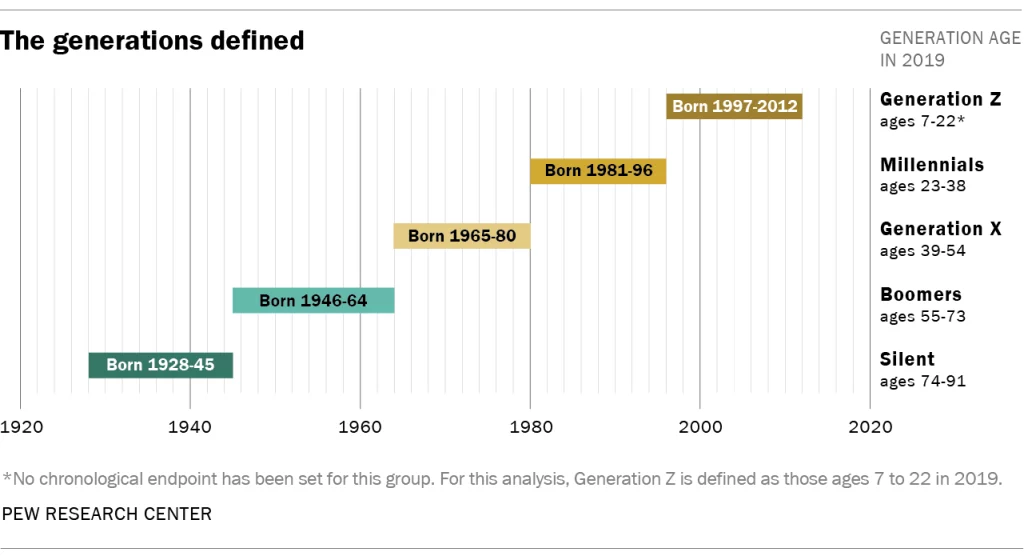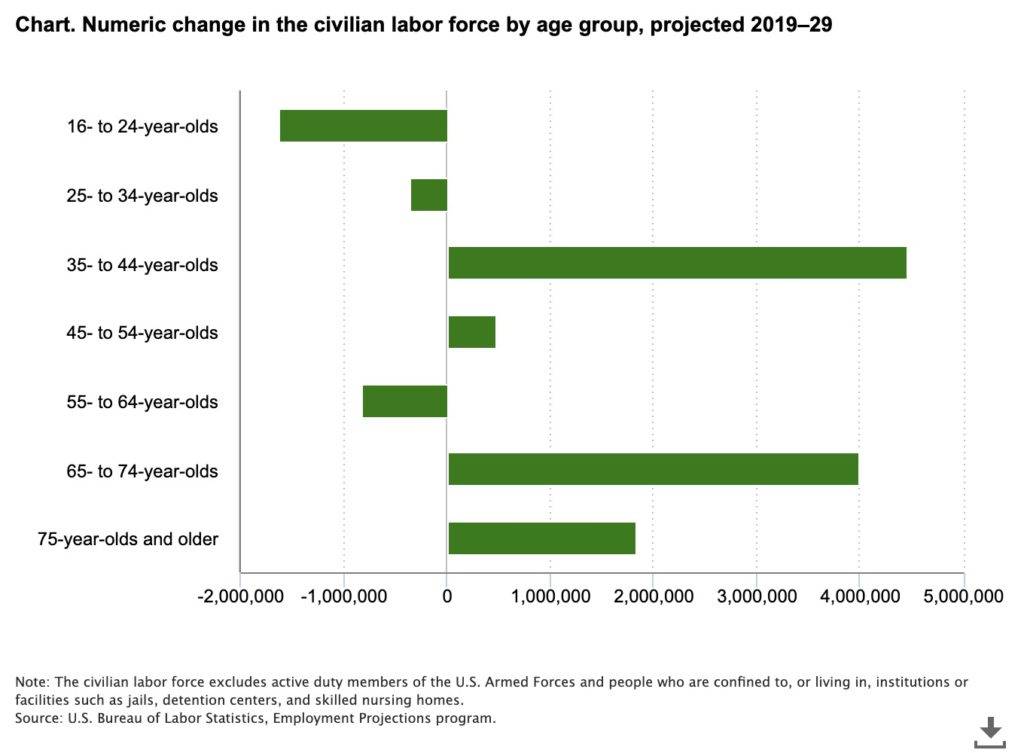The millennial generation is a force to be reckoned with. They are perhaps the most diverse generation in American history, quickly changing how our society functions. So how do you attract millennials to church?
Your church leadership needs to dig into questions like: What entices millennials to attend service? What are Millennials looking for in a church? In this conversation, we’ll cover some facts about this generation and five ways that churches can attract and retain millennial churchgoers!
Estimated reading time: 16 minutes
Table of contents
Who is the Millennial Generation?

There’s always room for interpretation when defining the generations and drawing lines. Any time you’re talking about a large group of people, it can be dangerous to paste labels….or to make sweeping assumptions.
Just keep that in mind throughout this conversation. We’re not saying that ALL the characteristics will apply to every person you meet in this age bracket; these are generalizations. The critical point is that churches can use new strategies to create an atmosphere that will engage, disciple, and retain the next generation.
When Were Millennials Born?

Pew Research defines Millennials as those born between 1981 and 1996. So, they’re currently around 27-41 years old. Millennials have grown up in a culture full of technological advancements and have an unquenchable thirst for knowledge.
What Do Millennials Value?
Here are some things Millennials value:
- They demand authenticity from the organizations they associate with
- They value personal growth
- They long to be a part of something bigger than themselves
- They also want to be involved in meaningful conversations
- They want to know that they are making a difference
- They are a tech-savvy generation
In short, millennials have a longing for truth and are very purpose-driven. They want to see real change in their communities. Most Millennials are also digital natives. That means that technology, communication, and social media are integral to their lives.
Why Do Church Leaders Need to Worry About Millennials?
First of all, many church leaders probably ARE millennials. In addition, although they used to be considered the next generation of young people, millennials are now adults. They’re in the workforce, many of them have families, and they’re primarily in their 30s.
So, churches need to attract millennials not only to attract young adults or a new group of churchgoers but because millennials are today’s decision-makers.
By 2029, millennials will shift into the 35-44 year-old age bracket. The Bureau of Labor Statistics (BLS) projects this group’s labor force size to increase by 4.5 million, the largest of any age group.

12 Ways Churches Can Attract Millennials
1. Create Meaningful Community
Millennials seek connections with like-minded people who share their values and beliefs. So make sure your church prioritizes building relationships.
Younger members have grown up in a hyper-connected digital world. Yet, at the same time, they feel lonely, isolated, and lacking true connection. According to a report by Telstra, 54% of Gen Z and 51% of Millennials say they feel lonely either often, always, or some of the time. This is higher than all other generations.
However, the majority of millennials are accustomed to communicating through screens. So sometimes, in-person interactions can be more challenging for them than for older generations. And that brings us to two additional points for how to build church community.
- Provide opportunities for younger generations at your church to interact through social media and online. Sometimes this is a comfortable first step to an in-person relationship.
- Don’t assume millennial members will take the initiative to build relationships like older members might. Provide small group environments and other ways to connect, guide the conversation, and help people take the first step.
2. Embrace Technology

Technology can be an invaluable tool for reaching millennials. Churches must embrace digital media and stay current with the latest trends to attract millennials.
Recent studies have shown that over half of millennials watch church online or a combination of online and in-person church. These church attendance patterns are persisting post-pandemic. And that’s because millennials are accustomed to consuming every kind of media (from books to streaming TV series) on their phones.
Other ways to embrace technology and build a digital presence include:
- Interactive social media presence
- Online giving options
- A high-quality online church experience
- An intuitive and well-designed website, church management software, and other tools like your church app
3. Utilize Social Media
Beyond embracing technology to attract millennials, you must utilize the fullness of social media. Social media marketing is going to be the key to getting this generation’s attention. This doesn’t mean you have to pay for advertisements through social media platforms necessarily, but you have to be active and consistent on them.
Your social media marketing strategy should follow popular trends and use aesthetics, phrases, and videos that are attractive to millennials. The majority of content millennials consume on social media is user-generated content and influencer marketing. That means the goal is to create something that can spread on social media like wildfire, with everyone posting/reposting about it.
We’re not saying you have to use full social media campaigns or use all your energy and resources on social media strategies, we’re just saying to be active, consistent, and adaptable. If you have millennials on staff you can use to run your church’s social media accounts, they will know the best way to go about it, as they will know what is “in” and effective.
4. Offer Opportunities for Growth

Millennials are interested in learning and doing a deep dive into their faith. So, as a church leader, think about educational programs and spiritual development opportunities.
Younger churchgoers want to learn about God, the Bible, theology, and how to deal with life. Think outside of the traditional Sunday School format by offering:
- Workshops/seminars
- Online classes and small groups
- Debate and dialogue
Millennials tend to appreciate engaging topics that raise questions of faith and values. They want to discuss their beliefs in an open, honest environment.
Remember that many millennials grew up in a post-Christian culture. Unlike previous generations, today’s youth may have never touched a Bible. And church culture standards like devotional time, small group studies, and serving may be foreign concepts.
So the lead pastor and church leaders shouldn’t shy away from addressing gospel and ministry basics. Millennials are looking for clarity.
5. Help Them Find Purpose and Make a Difference
Young adults want to have a purpose in life and make a difference in the world around them. Your church community is all about this exact cause! Churches want to reach people, spread the great news of Jesus Christ, and serve others.
Often, the church provides tangible needs through community service, financial giving, and missions.
Encourage millennial members to serve at your church by providing opportunities for leadership and involvement both inside and outside the church’s walls. Social justice is a hot topic for millennials. Ultimately, as you engage people, share a message of truth, and help others through the ministry, the church can change the world. And this will definitely attract millennials.
6. Focus on Issues of Importance and Challenge

As a church leader, are you in touch with the challenges and issues facing your millennial members?
According to YPulse, the 15 biggest problems among 13-39-year-olds (millennials and gen z) include:
- Inflation
- Technology over-dependence / addiction
- Pandemic / COVID-19
- Racism
- Social media
- Economy
- Climate change / Global warming
- Acceptance / tolerance / respect of differences (e.g. values, opinions, cultures)
- Mental health
- Job opportunities
- Crimes and violence
- Government
- Affordable housing / housing availability
- Bullying
- Social disconnection
Many churches aren’t addressing the biggest challenges faced by this generation. But if you can help them with practical challenges like money management and financial literacy, you can lessen major stressors affecting members’ mental health. And also help them uncover a biblical approach for dealing with practical problems.
7. Offer Flexible Service Times
Millennials often have busy schedules, so offering flexible service times or alternative worship experiences can make it easier for them to participate. These include things such as evening services or midweek gatherings.
Unlike most baby boomers and Gen X’ers, they don’t live under the assumption of keeping Sunday mornings free. Often they will have work scheduled during that time, or some other type of consistent event they attend. Night services (Saturday and Sunday specifically) seem to be a lot more attractive for your target millennial audience.
Flexible service times cater to the dynamic schedules of millennials, acknowledging the challenges they face in balancing work, social commitments, and personal pursuits. By offering varied worship hours, your church demonstrates adaptability and inclusivity. This flexibility accommodates diverse lifestyles, making it easier for millennials to engage with the church community.
It can break down barriers to attendance, fostering a sense of belonging and ensuring that their spiritual journey aligns seamlessly with their busy lives. Ultimately, flexible service times reflect a commitment to meeting millennials where they are and creating a welcoming space for their spiritual exploration and growth.
8. Seek and Use Feedback

Seeking and valuing feedback within a church community, especially from millennials, is crucial for creating a welcoming and responsive environment. Actively soliciting input demonstrates a commitment to inclusivity and a genuine desire to understand the diverse perspectives and needs of the congregation. Establishing accessible channels for feedback, such as suggestion boxes, surveys, or open forums, invites honest communication. The more digitally efficient the feedback channel, the better.
But you want to do more than just seek feedback. You need to actually use it too. Demonstrating a willingness to listen, learn, and adapt based on the received input builds trust and strengthens the sense of community. It conveys a message that every voice matters and contributes to the collective growth of the church.
For millennials, in particular, who often seek authenticity and meaningful connections, knowing that their opinions are not only heard but also valued reinforces their engagement. Leaders should transparently communicate how the feedback has influenced decisions or prompted changes, creating a sense of ownership among the community members.
Feedback should be seen as a tool for continuous improvement, helping your church align its practices, programs, and messaging with the evolving needs of the congregation. By integrating feedback loops into the fabric of the church, your leaders can cultivate an environment of mutual respect, collaboration, and shared responsibility. This can foster a vibrant and adaptable community that reflects the values and aspirations of its members.
9. Development and Life Skills Workshops
Finally, we have workshops specifically built to help millennials with all their adulting needs. Professional development and life skills workshops within a church setting can offer a holistic approach to nurturing the well-being of individuals, especially millennials. By providing opportunities for skill-building and personal growth, the church becomes a valuable resource beyond spiritual development.
Professional development workshops focus on enhancing career-related skills, offering guidance on resume building, interview preparation, and career planning. These sessions acknowledge the aspirations and challenges millennials face in the professional world, providing practical tools to navigate their careers successfully.
Life skills workshops address broader aspects of personal development, covering areas such as financial literacy, communication skills, time management, and emotional intelligence. This comprehensive approach recognizes that spiritual growth is intertwined with everyday life.
By facilitating these workshops, the church becomes a supportive community that equips individuals not only for spiritual journeys but also for the challenges of the secular world. When a millennial starts to view your church as a place where they can be challenged, taught, and grown, it will make them much more likely to come back week after week.
10. Authenticity in Leadership

If there’s anything young people can see right through, it is fakeness. Young men and women in this day and age have been hurt so much by deceivers and hypocrites, that they are always on the lookout for them. This means that when millennials are looking for a church to call home, they are going to be testing the words and actions of the leadership.
Millennials value authenticity in church leadership for several reasons:
Trust and Relatability
Millennials desire leaders they can trust and relate to on a personal level. Authenticity builds trust between leaders and church members, creating a sense of connection and reliability.
Genuine Relationships
Authentic leaders in the church foster genuine relationships with church members. Millennials seek community and authenticity allows for deeper connections and a sense of belonging within the church family.
Transparency and Honesty
Authentic leaders are transparent and honest about their beliefs, values, and actions. Church members appreciate leaders who are open about their shortcomings and struggles, as it creates an environment of honesty and acceptance.
Meaningful Engagement
Millennials want to be actively engaged in their faith journey. Authentic leadership encourages meaningful engagement by providing opportunities for church members to participate, contribute, and grow spiritually.
Reflecting Values
Authentic leaders reflect the values of the church community and prioritize the well-being of church members above personal interests or agendas. This alignment of values creates a sense of unity and purpose within the church.
Authenticity in Action
Authentic leaders lead by example, demonstrating their faith through their actions and decisions. Church members are inspired by leaders who live out their beliefs authentically, motivating them to do the same in their own lives.
Emotional Connection
Authenticity creates an emotional connection between leaders and church members. When leaders share their joys, sorrows, and triumphs with authenticity, it creates a sense of empathy and understanding within the church community.
Spiritual Growth
Authentic leadership promotes spiritual growth and discipleship among church members. Millennials are drawn to leaders who challenge them to deepen their faith and live out their beliefs in tangible ways.
Overall, authenticity in church leadership is essential for building trust, fostering genuine relationships, and nurturing spiritual growth among millennials and church members alike.
11. Relevant Messages

Beyond just focusing on issues of importance on a global scale, millennials want messages that are relevant to their day-to-day lives. Millennials seek relevant messages in church because they want teachings that directly connect with their lives and address the issues they encounter in today’s world. Here’s why:
Firstly, relevance helps them see the practical application of faith in their daily experiences. Millennials are navigating a fast-paced and ever-changing society, and they desire guidance rooted in their current realities. Relevant messages bridge the gap between ancient scriptures and modern challenges, showing how timeless truths can be applied to contemporary situations.
Secondly, millennials value authenticity and honesty in their spiritual journey. They are skeptical of generic or overly abstract messages that feel disconnected from their lives. Relevant messages demonstrate that the church understands and cares about the issues they face, fostering a sense of trust and authenticity within the faith community.
Here are some examples of relevant messages your church could speak on:
- Mental Health and Wellness: Addressing topics like anxiety, depression, and stress management from a biblical perspective. Providing encouragement and practical strategies for mental well-being.
- Relationships and Communication: Offering guidance on building healthy relationships, resolving conflicts, and practicing effective communication skills within families, friendships, and communities.
- Social Justice and Advocacy: Discussing issues of racial equality, economic justice, environmental stewardship, and human rights. Emphasizing the church’s role in promoting justice and compassion in society.
- Purpose and Calling: Exploring themes of identity, vocation, and purpose in life. Helping individuals discern their God-given gifts, passions, and calling to make a meaningful impact in the world.
- Authentic Faith and Doubt: Creating space for honest exploration of faith, addressing doubts, questions, and struggles with spiritual authenticity and integrity, while reaffirming the enduring truth and relevance of Scripture.
Millennials want relevant messages in church because they seek guidance, authenticity, intellectual stimulation, and validation of their experiences. Relevant teachings help them navigate life’s challenges, deepen their faith, and feel connected to a supportive community of believers.
12. Engaging Worship Sets
Millennials desire engaging worship sets in the church because they seek meaningful connection and participation in their spiritual experience. Worship is one of the main ways Christians (especially new Christians) can connect with God and express themselves spiritually without drawing too much attention.
Here’s why having awesome worship sets for millennials could be huge:
Firstly, engaging worship sets create an atmosphere of authenticity and sincerity. Millennials value worship that feels genuine and heartfelt, where they can express their devotion and connect with God in a meaningful way. Dynamic music, heartfelt lyrics, and passionate worship leaders help cultivate an environment where millennials can engage authentically with their faith.
Secondly, engaging worship sets provide a sense of community and belonging. Millennials appreciate being part of a collective worship experience where they can join together with fellow believers in praising God. Through uplifting songs and communal singing, engaging worship sets foster a sense of unity and shared purpose among church members.
Millennials want engaging worship sets in the church because they desire authenticity, community, spiritual renewal, and creativity in their worship experience. Engaging worship sets help millennials connect with God, with each other, and with the deeper dimensions of their faith in meaningful and transformative ways.
Building for the Younger Generation

Almost every church leader realizes it’s vital to reach Millennials. This group is well past its youth group days! Young adult Millennials have kids, full-time jobs, and a tremendous influence on society and their community.
Attracting Millennials to your church is essential for the long-term success of a local congregation. They are the NOW generation that’s raising the NEXT generation. As you keep these five steps in mind, your church will attract and retain Millennial members and become more successful in their mission.
More on Church and Millennials






Comments 1
Hi- Great info on Millennials. I am not a church leader but am pushing my church to try and reach this group. I have 3 kids , all who grew up in the church but who don’t find church relevant. When one decided to go back to church, she could not find anything in her area- Melbourne Florida- aimed at her aged group.
I looking for churches who have successfulfuk ministries geared toward 25-35 year olds so we do not have to reinvent the wheel. Do you know some examples? I’d appreciate any direction you might have. Thanks Chris Coughlin